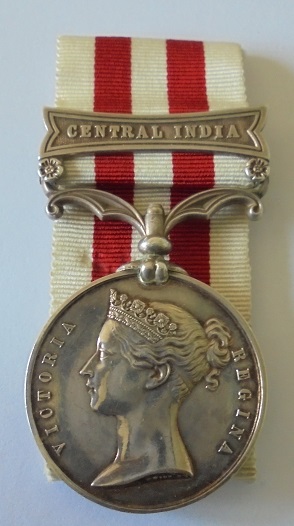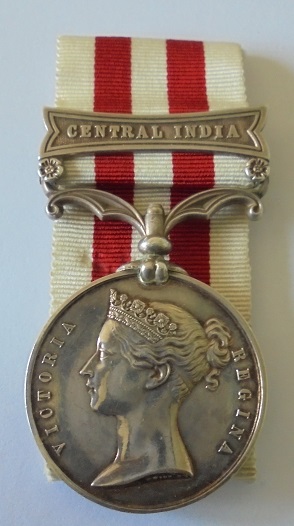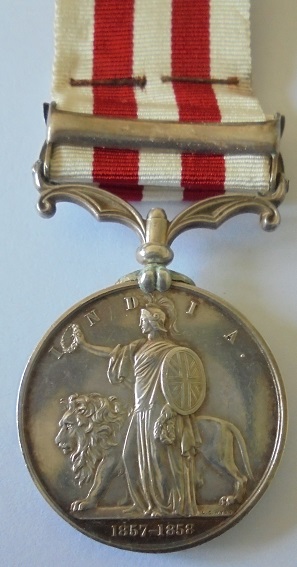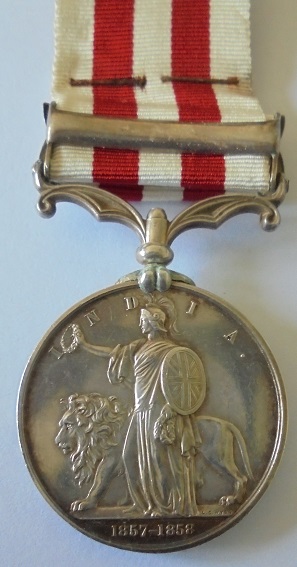2
Indian Mutiny Medal, no bar, named to Major W.F. Eden. (the unit has been erased) Major, later
Indian Mutiny Medal, no bar, named to Major W.F. Eden. (the unit has been erased) Major, later Colonel William Frederick Eden, 1st Regiment Native Infantry and Political Department. Ex Sotheby’s 2001. Colonel William Frederick Eden was born on 31 August 1814. He was the son of Thomas Eden and Frances Eliza Rodney. Attended Addiscombe College, applied for a cadetship with the East India Company Army in the 1830-31 recruiting season. 2nd Lieutenant 11th Jun 1833, Lieutenant 4th November 1836. He married Marie Sidonie Delaselle, daughter of Jean Isador Delaselle, on 1 January 1838. Joined the 1st Madras Native Infantry. Captain 7 April 1846. From Kaye and Malleson’s History of the Indian Mutiny of 1857-8 ‘The agent at Jaipur was Major William Eden, an officer possessing ability, firmness, and discretion. The reigning Rajah of Jaipur, Maharajah Ram Singh owed his throne, his education, it might almost be said his life, to the British. He had been extremely well educated, was naturally intelligent, and, being well acquainted with the history of Rajputana during the latter days of the Mughul sway and the entire period of Maratha oppression, he was profoundly convinced that his own safety, the permanence of his rule, and the prosperity of his subjects, were bound up in the maintenance of the British suzerainty. Major Eden then experienced no difficulty with the Maharajah. He was as eager to show his loyalty as Major Eden was to demand it. The same spirit animated his people generally. Unhappily it was not so with his army. The Sipahis composing it had come, for the most part, from the recruiting grounds which had supplied the British native army, and they were influenced by the same feelings of distruct and hostility. Here, too, as at Gwaliar, as at Indur, it was plainly shown that, when the fanaticism of an Oriental people is thoroughly aroused, not even their Rajah – their father as all consider him, their god as some delight to style him – not even their Rajah can bend them against their convictions. Five thousand of the Maharajah’s troops were indeed put in the field: - they even marched towards the districts of Mathura and Gurgaon with the avowed mission to maintain and re-establish civil government. But it quickly appeared that, if the maintenance of order and the re-establishment of civil government were to involve the necessity of fighting the revolted Sipahis, the Jaipur troops would neither maintain the one nor re-establish the other. Like the Sihor cavalry, they were prepared to defend European fugitives, but they would not wage aggressive warfare. Their views in this respect having been practically established, the five thousand Jaipur troops were recalled to their own territory.’ However, another piece written by an Indian, puts a different, (if somewhat sycophantic) spin on things with 7000 troops at Eden's disposal..From Dalit Literature:Our Response, by N.Shantha Naik. ‘(Page 293). In 1857, the Maharaja of Jaipur was Ram Singh, an intelligent prince, fully alive to the duties which developed upon him as ruler, and anxious to perform them. (Page 294) When the mutiny broke out, he acted in no uncertain manner. He at once placed the whole of his forces, amounting to between 6000 and 7000 troops at the disposal of the Political Agent, Major Eden, leaving only 700 sepoys and 1880 police for the defence of the capital. The Jaipur contingent, of some 6000 men (about half cavalry and half Naga infantry), with seven guns, set out under Major William Frederick Eden (the Resident). The commandant of this army was Faiz Ali Khan (the State Bakshi) and the second in command was Ranjit Singh, the Thakur of Achrol. Marching towards Delhi (which was then besieged by the English), Eden reached Rewari town but found the district of Gurgaon in a terrible state of anarchy. Everywhere the unruly Meo population was up in arms, sacking villages and towns and robbing the highways. Eden abandoned the idea of advancing north to reinforce the siege army before Delhia. He turned east from Rewari and entered Gurgaon district to suppress the banditti. Near Sohna (eight miles east of Tauru), the Jaipur Bakshi cut down the rebel thanadar of the place and burnt a number of Meo villages. At Sohna, the army was joined by about 30 Europeans fleeing from the rebels…mostly officers of the Civil service and the inland customs department. They were relieved and lodged in comfort in the moving camp. Thereafter this force took post for a long time between Palwal and Hodal, three quarters of the way up the great northern rod from Agra to Delhi. Sir Donald Stewart, afterwards Commander-in-Chief of India, who came into the Jaipur camp near Palwal as a refugee on 19th June 1857, and fell back with it to Hodal on the 23rd, wrote on the 27th: “Mutiny of two or three of the Jaipur Poorbeea regiments who have made off in a body from our camp to join the rebels at Delhi. Fortunately, the national (i.e. Kachhawa) troops of the Jaipur State remained staunch…The Nagas and the Shekhawati thakiurs converted themselves into a sort of bodyguard, and kept strict watch over the Political Agent’s camp.” But the heavy rains of that year brought on epidemic fever (page 295) and cholera; many of the soldiers perished, many deserted through alarm; and at last the Jaipur commanders begged and obtained Major Eden’s permission to take their men back to Jaipur, as they could be of no further use at Palwal. But before their return home, a detachment from them led by Thakurs Bhupal Singh Nathwat and Sobhag Singh Larkhani, escorted the refugee European safely to Agra fort, which the Lt.Governor James Colvin, was holding out against the rebels. During this interval of Major Eden’s absence, his wife and other Europeans of that region were housed by Maharajah Ram Singh in the Badal Mahal Palace, and latterly in the lofty Nahagarh fort towering above his capital. The sepoy brigade at Nasirabad, mutinied on 28th May, and while passing by Jaipur, on their way to Delhi, called upon Maharajah Ram Singh to deliver up his European proteges. This he refused, and defied them to attack his capital, though denuded of his army at that time. They then hastened on to Delhi. The destitute British officers, whose soldiers had deserted them at Nasirabad and Nimach, were sent with every necessary assistance to Agra Fort, under escort of Thakir Puran Singh of Jaipur. They started from Nasirabad on 11th November and after being relieved on the way by the kind attentions of Major Eden at Jaipur and Captain Nixon at Bharatpur, arrived safely at Agra on 3rd December 1857.’ After the Mutiny he served as Governor General Agent for Rajpootana. Lt Colonel 18 February 1863, Colonel 18th February 1866 (Madras Staff Corps). He died fever and exhaustion (in connection with previous illness) on 14 November 1867 at age 53. Like with other Officer Mutiny Medals whom were also Political Advisers the unit has been erased from the medal thereby giving them almost a Civilian appearance.
To bid on this or other lots, please visit our website and use our secure bidding facility
Indian Mutiny Medal, no bar, named to Major W.F. Eden. (the unit has been erased) Major, later Colonel William Frederick Eden, 1st Regiment Native Infantry and Political Department. Ex Sotheby’s 2001. Colonel William Frederick Eden was born on 31 August 1814. He was the son of Thomas Eden and Frances Eliza Rodney. Attended Addiscombe College, applied for a cadetship with the East India Company Army in the 1830-31 recruiting season. 2nd Lieutenant 11th Jun 1833, Lieutenant 4th November 1836. He married Marie Sidonie Delaselle, daughter of Jean Isador Delaselle, on 1 January 1838. Joined the 1st Madras Native Infantry. Captain 7 April 1846. From Kaye and Malleson’s History of the Indian Mutiny of 1857-8 ‘The agent at Jaipur was Major William Eden, an officer possessing ability, firmness, and discretion. The reigning Rajah of Jaipur, Maharajah Ram Singh owed his throne, his education, it might almost be said his life, to the British. He had been extremely well educated, was naturally intelligent, and, being well acquainted with the history of Rajputana during the latter days of the Mughul sway and the entire period of Maratha oppression, he was profoundly convinced that his own safety, the permanence of his rule, and the prosperity of his subjects, were bound up in the maintenance of the British suzerainty. Major Eden then experienced no difficulty with the Maharajah. He was as eager to show his loyalty as Major Eden was to demand it. The same spirit animated his people generally. Unhappily it was not so with his army. The Sipahis composing it had come, for the most part, from the recruiting grounds which had supplied the British native army, and they were influenced by the same feelings of distruct and hostility. Here, too, as at Gwaliar, as at Indur, it was plainly shown that, when the fanaticism of an Oriental people is thoroughly aroused, not even their Rajah – their father as all consider him, their god as some delight to style him – not even their Rajah can bend them against their convictions. Five thousand of the Maharajah’s troops were indeed put in the field: - they even marched towards the districts of Mathura and Gurgaon with the avowed mission to maintain and re-establish civil government. But it quickly appeared that, if the maintenance of order and the re-establishment of civil government were to involve the necessity of fighting the revolted Sipahis, the Jaipur troops would neither maintain the one nor re-establish the other. Like the Sihor cavalry, they were prepared to defend European fugitives, but they would not wage aggressive warfare. Their views in this respect having been practically established, the five thousand Jaipur troops were recalled to their own territory.’ However, another piece written by an Indian, puts a different, (if somewhat sycophantic) spin on things with 7000 troops at Eden's disposal..From Dalit Literature:Our Response, by N.Shantha Naik. ‘(Page 293). In 1857, the Maharaja of Jaipur was Ram Singh, an intelligent prince, fully alive to the duties which developed upon him as ruler, and anxious to perform them. (Page 294) When the mutiny broke out, he acted in no uncertain manner. He at once placed the whole of his forces, amounting to between 6000 and 7000 troops at the disposal of the Political Agent, Major Eden, leaving only 700 sepoys and 1880 police for the defence of the capital. The Jaipur contingent, of some 6000 men (about half cavalry and half Naga infantry), with seven guns, set out under Major William Frederick Eden (the Resident). The commandant of this army was Faiz Ali Khan (the State Bakshi) and the second in command was Ranjit Singh, the Thakur of Achrol. Marching towards Delhi (which was then besieged by the English), Eden reached Rewari town but found the district of Gurgaon in a terrible state of anarchy. Everywhere the unruly Meo population was up in arms, sacking villages and towns and robbing the highways. Eden abandoned the idea of advancing north to reinforce the siege army before Delhia. He turned east from Rewari and entered Gurgaon district to suppress the banditti. Near Sohna (eight miles east of Tauru), the Jaipur Bakshi cut down the rebel thanadar of the place and burnt a number of Meo villages. At Sohna, the army was joined by about 30 Europeans fleeing from the rebels…mostly officers of the Civil service and the inland customs department. They were relieved and lodged in comfort in the moving camp. Thereafter this force took post for a long time between Palwal and Hodal, three quarters of the way up the great northern rod from Agra to Delhi. Sir Donald Stewart, afterwards Commander-in-Chief of India, who came into the Jaipur camp near Palwal as a refugee on 19th June 1857, and fell back with it to Hodal on the 23rd, wrote on the 27th: “Mutiny of two or three of the Jaipur Poorbeea regiments who have made off in a body from our camp to join the rebels at Delhi. Fortunately, the national (i.e. Kachhawa) troops of the Jaipur State remained staunch…The Nagas and the Shekhawati thakiurs converted themselves into a sort of bodyguard, and kept strict watch over the Political Agent’s camp.” But the heavy rains of that year brought on epidemic fever (page 295) and cholera; many of the soldiers perished, many deserted through alarm; and at last the Jaipur commanders begged and obtained Major Eden’s permission to take their men back to Jaipur, as they could be of no further use at Palwal. But before their return home, a detachment from them led by Thakurs Bhupal Singh Nathwat and Sobhag Singh Larkhani, escorted the refugee European safely to Agra fort, which the Lt.Governor James Colvin, was holding out against the rebels. During this interval of Major Eden’s absence, his wife and other Europeans of that region were housed by Maharajah Ram Singh in the Badal Mahal Palace, and latterly in the lofty Nahagarh fort towering above his capital. The sepoy brigade at Nasirabad, mutinied on 28th May, and while passing by Jaipur, on their way to Delhi, called upon Maharajah Ram Singh to deliver up his European proteges. This he refused, and defied them to attack his capital, though denuded of his army at that time. They then hastened on to Delhi. The destitute British officers, whose soldiers had deserted them at Nasirabad and Nimach, were sent with every necessary assistance to Agra Fort, under escort of Thakir Puran Singh of Jaipur. They started from Nasirabad on 11th November and after being relieved on the way by the kind attentions of Major Eden at Jaipur and Captain Nixon at Bharatpur, arrived safely at Agra on 3rd December 1857.’ After the Mutiny he served as Governor General Agent for Rajpootana. Lt Colonel 18 February 1863, Colonel 18th February 1866 (Madras Staff Corps). He died fever and exhaustion (in connection with previous illness) on 14 November 1867 at age 53. Like with other Officer Mutiny Medals whom were also Political Advisers the unit has been erased from the medal thereby giving them almost a Civilian appearance.
To bid on this or other lots, please visit our website and use our secure bidding facility
16th April 2019 Medal and Militaria Auction
Ends from
Venue Address
For Wellington Auctions delivery information please telephone 07789 995782.
Important Information
All bidding via our website at www.wellingtonauctions.com, or via phone or email (details on our website)
Terms & Conditions
T's and C's
1) Estimated Values – The estimated values shown after each lot are the auctioneer’s estimate of what the lot is expected to realise. The lower of these figures is indicative of although not necessarily the reserve. Bids below this amount may be subject to refusal.
2) Telephone Bidding - We are happy to accept bids by telephone, via the number given, please leave a message if we are unable to answer your call, and we will phone you back. Also please ensure any Telephone bids are placed a minimum of 1 hour before the auction finishes, so that we can make sure your bid is placed in time.
3) Internet Bidding – Bids by email, can be accepted through our website – mail@wellingtonauctions.com, they must include your regular postal address at the time of bidding, so as to allow us to include the correct postal costs on any relevant invoices. All bids will be confirmed by reply before the end of the sale, if you do not receive a confirmation, please telephone. Please ensure any email bids are sent and confirmed by us, a minimum of 1 hour before the auction finishes to ensure we have time to place the bid on your behalf. While we will endeavour to place bids after this time, we cannot guarantee that we will be able to do so.
4) Telephone Bidding – Telephone bids will be accepted, but we will not be liable for any errors in transcribing lot numbers or bid amounts via this method, although every effort will be made to ensure accuracy..
5) Succesful bidders will be emailed their invoices, please contact us after 24 hours if you believe you have won an item but have not heard from us.
6) Wellington Auctions acts as agent only and is not liable for any default of the purchaser, or of the vendor.
7) ‘As is’ and ‘offered on their merits’ lots may not be returned for any reason.
8) Any returns must be received within 28 days of the closing auction date, at which point we pay out our vendors, any items returned after this period for any reason, we will reserve the right to refuse to refund.
Please note – all lots are liable to a Buyer’s Premium of 12.5%
Payment can be made by the following methods: (where extra costs mentioned, these figures are what we are charged by Paypal or by our Bank)
Cash by Special Delivery or delivered in person (this at the senders risk!)
Cheque or Bankers Draft made payable to ‘Medal Auctions’
Debit Card / Credit Card – NO CHARGE
Direct Electronic Transfer – we can supply the relevant details on request.
Postage
All our postage is done 'in-house', and all items are shipped as quickly as possible, typically a maximum of 2-3 days after payment is received. Example costs as follows:
1 Medal via Special Delivery - £8
1 Medal to Europe via insured post - £10
1 Medal to USA via International Signed For - £12
Online Bidding
Online bidding is only available via our website at www.wellingtonauctions.com, card details are not required prior to bidding.












